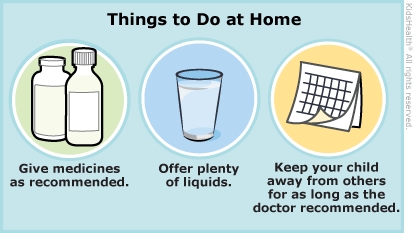Measles is an illness caused by a virus (type of germ). At first, kids with measles get a high fever, red and watery eyes, runny nose, spots inside the mouth, and a cough. Then about 3–5 days later, they get a rash that starts on the face and spreads down to the rest of the body.
There is no treatment for the measles virus, but most children recover fully within about 2 weeks. Rarely, a child may develop problems with the eyes, lungs, or brain.
Measles spreads very easily from person to person. Here's how to care for your child and help prevent the spread of measles.



Your child:

Your child:

How does measles spread? Someone with measles spreads the virus through the tiny drops that come out of the mouth and nose when they cough or sneeze. They can spread the virus from about 4–5 days before the rash appears until about 4 days after it appears.
Can measles be prevented? The best way to prevent measles is to get the measles vaccine. For most kids, two doses are usually given: one at 12–15 months and one at 4–6 years. Someone who is fully vaccinated is very unlikely to get measles even if they are in close contact with someone who is infected.
If someone isn't fully vaccinated against measles and is near someone with measles, getting the vaccine within 3 days might give some protection against the virus.
Can my child get measles again? Once someone has measles, they have immunity for life. So, it's very unlikely that your child will get measles again.